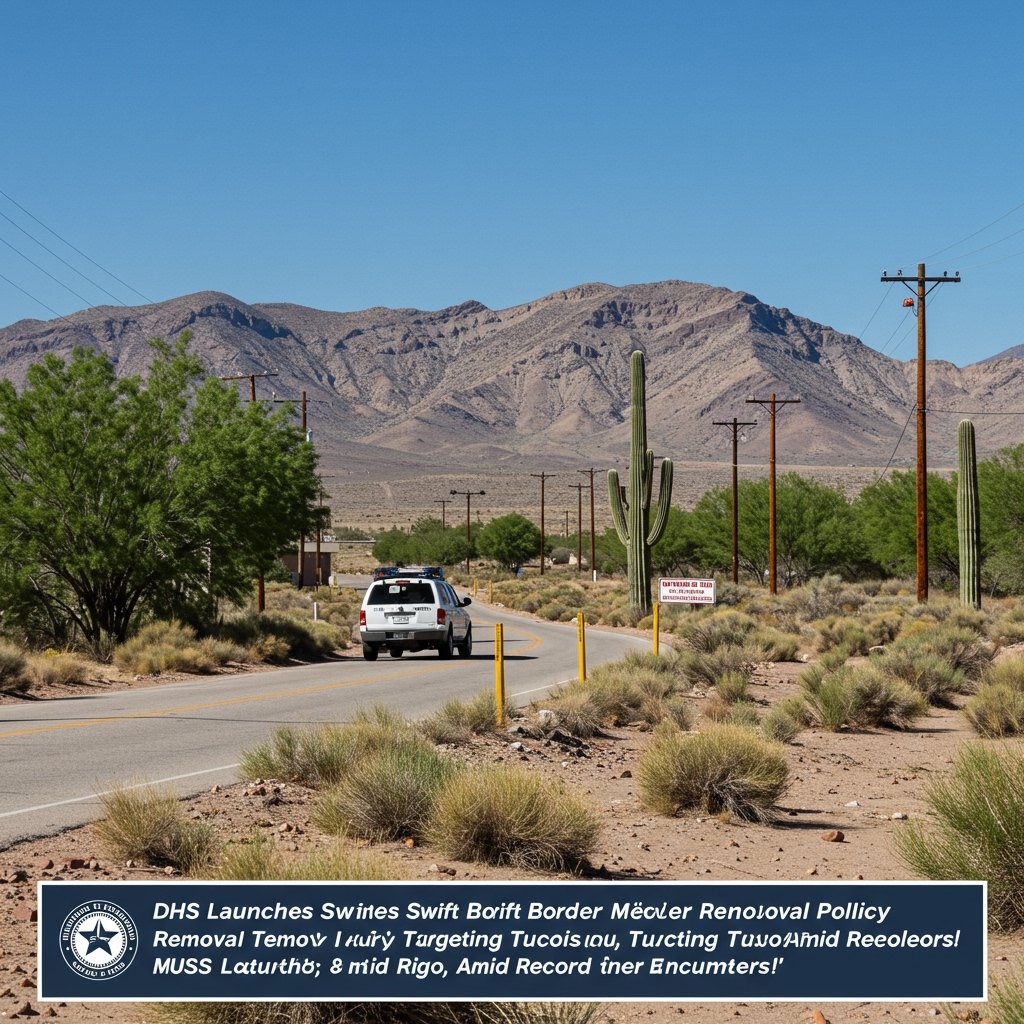DHS Implements Accelerated Border Enforcement Policy
The Department of Homeland Security (DHS) today announced the activation of a significant new protocol designed to heighten enforcement capabilities along the U.S.-Mexico border. This stricter measure is specifically aimed at intercepting and processing individuals who cross the border unlawfully between designated ports of entry, with an initial operational focus placed squarely on the Tucson and Del Rio sectors.
Policy Details: Swift Removal Within 24 Hours
Central to the new policy is a directive for greatly expedited removal proceedings. Under this protocol, non-Mexican migrants encountered by border authorities between ports of entry are subject to swift processing and removal, often mandated to occur within 24 hours of apprehension. This rapid timeline applies specifically to individuals who do not express a fear of persecution or an intent to seek asylum during their initial encounter with border officials.
This mechanism represents a marked departure in processing speed for certain individuals compared to previous standard procedures under Title 8 immigration law, which could involve longer stays in the U.S. pending immigration court dates or other legal reviews. While expedited removal is a long-standing tool in U.S. immigration law, the new policy applies it with an unprecedented emphasis on speed and specific conditions (encountered between ports, non-Mexican nationality, failure to express fear of persecution), aiming to quickly effectuate the return of individuals who do not appear to qualify for protection or other legal avenues.
The critical distinction in this policy is the response to the expression of fear. Should an individual express a fear of persecution or a desire to seek asylum upon initial encounter, they are to be referred for a credible fear screening, the initial step in the U.S. asylum process. However, the policy’s design is explicitly to bypass this lengthier screening and potential asylum process for those who do not articulate such a fear, leading directly to swift removal.
Rationale and Justification: Addressing High Volume Encounters
DHS officials justified the implementation of this accelerated policy by citing the overwhelming volume of encounters along the southern border, particularly in the targeted areas. They reported encounter rates exceeding 350,000 in the Tucson and Del Rio sectors over the last six months alone. The department argues that such high numbers necessitate more efficient processes to manage the border effectively, deter further unlawful crossings, and ensure operational control.
The government asserts that this policy is a necessary operational adjustment, authorized by recent executive action concerning border security, to address the current realities at the border. They contend that it allows authorities to focus resources more effectively on processing individuals who do articulate a fear of persecution while swiftly removing those who do not, thereby reducing the overall strain on the immigration system and border infrastructure.
Implementation Scope and Ramp-Up
The policy is being implemented immediately, with operations commencing in the Tucson and Del Rio sectors. These sectors were chosen due to the persistent high volume of migration flows and the operational challenges they present. DHS officials indicated that while the policy is now active, enforcement is expected to ramp up over the coming weeks as personnel are fully trained and deployed to execute the new protocols consistently and efficiently across the initial operational areas. The department plans to monitor the initial phase closely before considering potential expansion to other border sectors.
Legal Challenges and Civil Rights Concerns
The announcement was met with immediate and sharp criticism from civil rights organizations and immigrant advocacy groups. Several prominent organizations have announced their intention to file immediate legal challenges to the policy.
These groups argue vociferously that the rapid 24-hour removal timeline, coupled with encounters occurring between ports of entry where individuals may be disoriented or lack access to information and counsel, fundamentally undermines access to asylum protections. They contend that it violates due process rights guaranteed under U.S. law by not providing adequate time or opportunity for vulnerable individuals to understand their rights and articulate a potential claim for protection before being subject to swift deportation.
Critics express concern that legitimate asylum seekers may be rapidly removed without ever having their claims heard, arguing that the policy prioritizes speed over the U.S. legal and humanitarian obligations to individuals fleeing persecution. The legal challenges are expected to center on whether the policy is consistent with U.S. asylum law, statutory requirements for expedited removal, and constitutional due process protections. This sets the stage for a potentially significant legal battle over the future of border enforcement and asylum processing.
Outlook
The implementation of this new DHS policy marks a significant shift in the government’s approach to processing certain migrants encountered between ports of entry. While officials maintain it is a necessary step to manage high volumes and secure the border, civil rights groups are poised for a legal confrontation, arguing it sacrifices fundamental rights. The outcome of these legal challenges and the effectiveness of the policy in curbing irregular migration flows in the Tucson and Del Rio sectors will be closely watched in the coming weeks and months.






